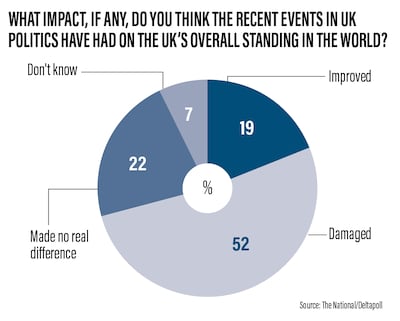More than half the British public do not have confidence in Liz Truss to perform at the highest levels as a world leader according to an exclusive poll for The National that found people believe Brexit has gone wrong.
A total of 52 per cent of respondents said they had little or no confidence in Ms Truss on the world stage and the same number agreed that Boris Johnson has damaged the UK's international standing.
Questioned on Brexit, 52 per cent of the public also agreed it was a bad thing that Britain had left the EU and, by a margin of 46 per cent to 19 per cent, that the process had gone badly.
Other findings in the wide-ranging poll:
- A majority (62 per cent) said that relations with the Arab world must be maintained or improved.
- A majority (56 per cent) said the UK had done enough to help Ukraine while 76 per cent backed the imposition of sanctions on Russia.
- A majority (78 per cent) backed global action to address the Europe-wide energy crisis.
- A majority (54 per cent) wanted the UN to lead efforts to resolve the Ukraine war.
- A majority (71 per cent) wanted the government to prioritise energy costs over addressing climate change challenges.
- A majority (54 per cent) agreed that Iran posed a nuclear threat to the UK and the world.

Just 6 per cent of the 2,096 British adults questioned by Deltapoll said they were “very confident” that Ms Truss would be an effective world leader. The research was carried out exclusively for The National from September 9-12, during Ms Truss’s first week in office.
The data captures the start of an era, coming just days after the death of Queen Elizabeth II and the accession of King Charles III, the first change on the UK throne in 70 years.
The outlook is clouded by the first war in a generation in Europe, soaring electricity and gas prices, Britain entering a recession and divisions over Brexit deepening long after the country decided to quit the EU.
Ms Truss is the fourth Conservative prime minister in a decade, a reflection of the turmoil on the political stage. She is promising a radical new departure for the government to pursue lower taxes, deregulation and faster economic growth.
Against this backdrop, 28 per cent of respondents maintained they felt “quite confident” she would do a good job as leader.
Nearly a third (30 per cent) said they were “not very confident” about her in 10 Downing Street, while 22 per cent said they were “not at all confident”.
The Brexit promise of a lift to British prosperity has faded with most respondents (43 per cent compared to 34 per cent) saying the trade deals that have been struck with countries such as Australia have been “generally bad” for the UK.
The country remains outward looking despite the vicissitudes of recent years with 62 per cent looking for the same or better ties with Arab countries.
Anand Menon, professor of European politics and foreign affairs at King’s College London and director of the UK in a Changing Europe think tank, pointed out that it is still early days to say what kind of leader Ms Truss is likely to be.
He suggested that levels of public confidence in her could rise steadily over the coming months if her emergency package of measures achieves its aim of effectively reducing the strain of the cost of living crisis on households and businesses.
Prof Menon said much would also depend on how Labour would seize the crisis as an opportunity to boost itself as a government in waiting, and paint the Truss administration as ineffective. He said it “hinges on Labour banging home the message” that “this is the government for the few”.

Boris Johnson's toxic legacy
The highs of the Johnson administration — the delivery of Brexit and the early introduction of Covid-19 vaccines — were not enough to make up for his failures, the poll suggests. Prof Menon said the “Boris Johnson brand has been irrevocably tarnished” in the minds of many voters.
“It’s a poignant failure,” he said. “With Ukraine, that’s gone down quite well in Washington and also in eastern Europe.”
The ballot also showed that events in UK politics over the last few months have damaged Britain’s position in the international arena with only 7 per cent saying it had improved.
Prof Menon said events in Britain that recently made global headlines, regardless of whether they were positive or negative, have increased foreign interest in the country.
He said the perception abroad that the UK is boring “has been shattered” by recent happenings, which he argued was a good thing. “In 2015 we were proudly dull,” he said, recalling a time before the EU referendum which saw Brexit dominate conversations.
The historical legacy of Britain's involvement in conflicts overseas this century is something that people are keen to draw a line under. Despite the rise of the Taliban and the chaos that saw tens of thousands airlifted from Kabul airport, a total of 40 per cent said it was right to withdraw from the country with 37 per cent saying it was the wrong choice.
Two decades after the country was led to war on the premise that deposing Saddam Hussein in Iraq would transform the region along western parallels, a total of 42 per cent said it was the wrong course.
The effort to eradicate global terror networks and neutralise Al Qaeda, the group behind bombings and attacks in New York, London and Madrid among other targets, cannot be seen as a success from the poll findings. Rating the threat from 1-5 with the top figure representing a significant threat a total of 66 per cent said the group rated 3 or higher.































































